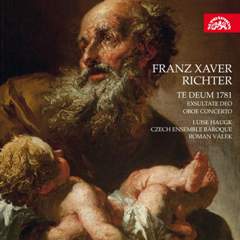Richter - Te deum 1781, Exsultate deo, Oboe Concerto (2018)
Richter - Te deum 1781, Exsultate deo, Oboe Concerto (2018)

Sinfonia No. 52 in D 1. Presto assai 05:19 2. Andantino e sempre piano 03:46 3. Presto 02:49 Te Deum 1781 4. Te Deum laudamus (coro) 02:43 5. Te gloriosus (duetto soprano, tenore) 03:21 6. Patrem immensae majestatis (coro) 01:09 7. Tu Rex gloriae (alto solo) 04:02 8. Te ergo quaesumus (coro) 01:13 9. Aeterna fac (tenore solo) 03:00 10. Et rege eos (coro) 01:22 11. Dignare Domine (basso solo) 03:27 12. In te Domine speravi (coro) 02:25 Oboe Concerto in F major 13. Allegro moderato 04:56 14. Andante 03:43 15. Vivace 03:17 16. Exsultate Deo 03:09 Markéta Böhmová, Pavla Radostová - soprano Piotr Olech - alto Jaroslav Březina, Jakub Kubín - tenor Jiří M. Procházka - bass Luise Haugk - oboe Czech Ensemble Baroque Roman Válek - conductor
Nearly 1,000 kilometres separate Holešov, Moravia, from Strasbourg, if one takes a detour through Mannheim. Franz Xaver Richter's professional journey started in Count Rottal's court orchestra in Holešov and ended in the prestigious post of Kapellmeister at the Cathédrale Notre-Dame in Strasbourg. He is primarily known as one of the major representatives of the renowned Mannheim School, with his "trumpet" Sinfonia No. 52 in D being a typical example of the late Mannheim form. The grandiose Te Deum, featured on the present CD, is Richter's second setting of the hymn and was first performed in 1781 in Strasbourg, during the celebrations marking the centenary of the city's coming under French administration. Along with the motet Exsultate Deo, the piece falls within the composer's vocal-instrumental oeuvre, which has yet to be explored (and, just as in the case of Jan Dismas Zelenka's music, contains many unexpected twists and turns). The virtuoso, engrossing and masterfully balanced Oboe Concerto with the original cadenzas represents Richter's concertante style. Following their premiere recordings of Richter's Requiem (Supraphon, SU 4177-2) and the Passion oratorio La Deposizione dalla croce di Ges? Cristo (SU 4204-2), the present Czech Ensemble Baroque CD maps another part of the remarkable 18th-century composer's work. ---supraphon.com
This is the third recording by these forces of Richter’s music, and once again it amply displays the many impressive facets of the composer’s output; alongside a grandiose setting of the Te Deum we hear an impressive symphony packed with pomp and circumstance, a little-known virtuosic oboe concerto (recorded on period instruments for the first time), and the first of four motets for a procession in Strasbourg on the Feast of Corpus Christi. Famed as he may nowadays be for his Mannheim symphonies, the more we are able to hear his church music, the better we are able to understand that Richter was no second-rate composer; the rousing openings of the symphony and the choral works show that he had an ability to seize the listeners’ attention and enough imaginative power to hold it for long periods – at over 22 minutes long, the Te Deum didn’t seem to last any time at all. The composer cannot take all the credit, though; this is a team effort, and Válek and his excellent musicians (the choir has four singers per part and he uses 44221 strings) are perfect advocates of their compatriot’s output; the soloists are taken from the tutti group (with the exception of tracks 5 and 9 where another tenor is used), and throughout the singing is first rate with nicely articulated lines and neat ornamentation. The booklet notes, which say no more than they have to (in four languages!), promise more releases in the series – I, for one, shall be waiting! ---Brian Clark, earlymusicreview.com
download (mp3 @320 kbs):
yandex mediafire uloz.to gett my-files.ru








